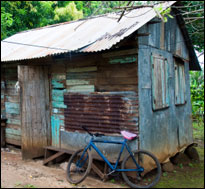Studies by sociologists and psychologists have often shown little correlation between self-reported levels of happiness and income. A 2011 World Bank study highlights the “paradox of unhappy growth,” whereby life expectations rise with incomes, reducing the happiness that increased prosperity may have otherwise brought about.
One noteworthy case study of how humans adapt amid difficult conditions and extreme poverty involves those who live off of garbage heaps in Nicaragua. Among the poorest people in one of the most impoverished countries in the Western hemisphere, these trash or waste pickers live off less than $1.50 a day; they typically crowd into one-room shanty structures with many other people and spend their days sorting through rotting pineapples, discarded candy wrappers and other detritus.
A 2013 study published in The Journal of Positive Psychology, “Happiness Among the Garbage: Differences in Overall Happiness among Trash Pickers in León (Nicaragua),” profiled the trash collectors by systematically surveying all of those who could be contacted in a single city — nearly 100 of them. The researcher, from the Spain-based Universidad de Alcalá, used illustrations and other special interviewing aides and techniques to overcome the subjects’ lack of education and low levels of literacy.
The study’s findings include:
- Of those surveyed, 49.5% of the collectors felt “quite” or “very happy,” 20.2% said they felt “a little happy,” and 11.1% reported feeling “neither happy nor unhappy.” Those who reported a degree of unhappiness represented 19.1% of those surveyed.
- Male trash pickers tended to be happier than female collectors, with 87% reporting some level of happiness versus 56% of women. (The study notes that, in general, “The scientific literature indicates that women tend to have lower levels of subjective well-being than men.”)
- Optimism tends to go hand-in-hand with happiness: Among those who believed the future will be better than the present, 14.5% were unhappy and 85.5% were happy. Of those with a poor future outlook, 60% were unhappy and 40% were happy.
- Trash collectors are not completely isolated from society: 63% claim to be in a relationship and most have between two and three children. Many of the men are active in sports activities (68.2%), read (53.4%) and walk (56.8%). Women are less active.
- While 22.7% reported being a victim of crime, there was no correlation between crime-related events and levels of happiness.
“What is truly remarkable,” the author writes, “is that the vast majority of the collectors are happy, and are convinced that they can achieve a better quality of life.” The study conjectures that this could be because of well-being obtained in other areas of life, especially in social relations and leisure activities.
Tags: poverty


Expert Commentary